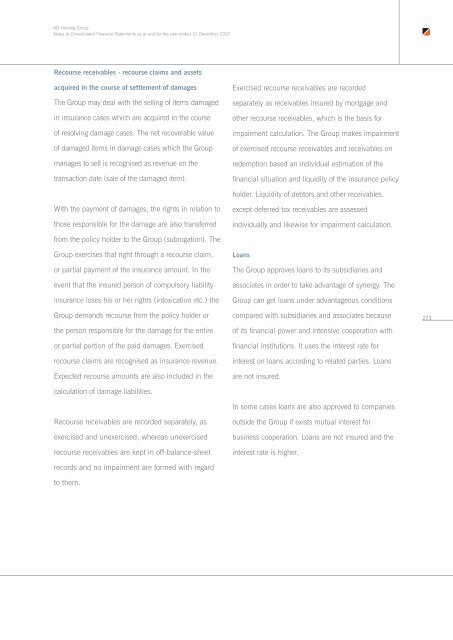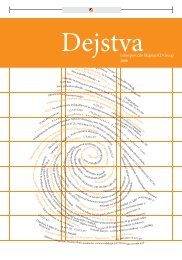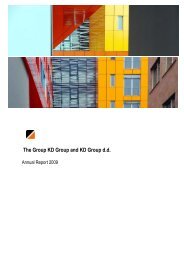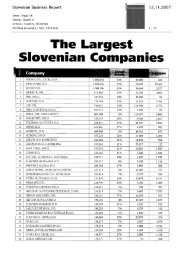KD Holding Group Notes to Consolidated Financial Statements as at <strong>and</strong> for the year ended 31 December 2007 Recourse receivables - recourse claims <strong>and</strong> assets acquired in the course of settlement of damages The Group may deal with the selling of items damaged in insurance cases which are acquired in the course of resolving damage cases. The net recoverable value of damaged items in damage cases which the Group manages to sell is recognised as revenue on the transaction date (sale of the damaged item). Exercised recourse receivables are recorded separately as receivables insured by mortgage <strong>and</strong> other recourse receivables, which is the basis for impairment calculation. The Group makes impairment of exercised recourse receivables <strong>and</strong> receivables on redemption based an individual estimation of the financial situation <strong>and</strong> liquidity of the insurance policy holder. Liquidity of debtors <strong>and</strong> other receivables, With the payment of damages, the rights in relation to those responsible for the damage are also transferred from the policy holder to the Group (subrogation). The Group exercises that right through a recourse claim, or partial payment of the insurance amount. In the event that the insured person of compulsory liability insurance loses his or her rights (intoxication etc.) the Group dem<strong>and</strong>s recourse from the policy holder or the person responsible for the damage for the entire or partial portion of the paid damages. Exercised recourse claims are recognised as insurance revenue. Expected recourse amounts are also included in the calculation of damage liabilities. Recourse receivables are recorded separately, as exercised <strong>and</strong> unexercised, whereas unexercised recourse receivables are kept in off-balance-sheet records <strong>and</strong> no impairment are formed with regard to them. except deferred tax receivables are assessed individually <strong>and</strong> likewise for impairment calculation. Loans The Group approves loans to its subsidiaries <strong>and</strong> associates in order to take advantage of synergy. The Group can get loans under advantageous conditions compared with subsidiaries <strong>and</strong> associates because of its financial power <strong>and</strong> intensive cooperation with financial institutions. It uses the interest rate for interest on loans according to related parties. Loans are not insured. In some cases loans are also approved to companies outside the Group if exists mutual interest for <strong>business</strong> cooperation. Loans are not insured <strong>and</strong> the interest rate is higher. 273
KD Holding Group Notes to Consolidated Financial Statements as at <strong>and</strong> for the year ended 31 December 2007 274 Neither Past due but not impaired Past due <strong>and</strong> impaired Total Individually Collective carrying past due Assets (in EUR) More amount <strong>and</strong> nor Up to 30 31-90 91-270 Gross value Impairment than 271 days days days Gross Impairment impaired days value Up to 31-60 61-90 91-270 More than Up to 30 31-60 61-90 91-270 More than 30 days days days days 271 days days days days days 271 days 2007 Debt securities 150,447,734 - - - - - - - - - - - - - - - - 150,447,734 Loans 57,749,747 974 - - 371 1,327,883 (1,327,883) - - - - - - - - - - 57,751,092 Receivables 41,908,915 4,206,593 514,557 523,470 320,250 17,755,186 (15,193,669) 7,181,936 2,741,113 5,924,646 12,396,462 34,042,881 (991,676) (930,398) (3,008,894) (6,567,524) (22,883,969) 77,939,879 - insurance receivables 17,091,945 3,219,250 130,283 135,831 35,379 - - 6,164,206 2,193,799 1,895,053 5,510,524 12,490,703 (477,869) (553,217) (480,968) (2,407,909) (9,348,778) 35,598,232 - recourse receivables - - - - - - - 278,009 495,314 3,977,593 6,833,562 19,248,544 (146,372) (350,357) (2,501,102) (4,132,541) (12,364,137) 11,338,513 - other receivables 24,816,970 987,343 384,274 387,639 284,871 17,755,186 (15,193,669) 739,721 52,000 52,000 52,376 2,303,634 (367,435) (26,824) (26,824) (27,074) (1,171,054) 31,003,134 Reinsurance assets 11,004,824 - - - - - - - - - - - - - - - - 11,004,824 TOTAL 261,111,220 4,207,567 514,557 523,470 320,621 19,083,069 (16,521,552) 7,181,936 2,741,113 5,924,646 12,396,462 34,042,881 (991,676) (930,398) (3,008,894) (6,567,524) (22,883,969) 297,143,529 2006 Debt securities 143,403,068 - - - - 2,479,462 (1,799,710) - - - - - - - - - - 144,082,820 Loans 60,178,678 - - 3,992 117,081 907,816 (907,816) - - - - - - - - - - 60,299,751 Receivables 31,507,266 3,819,168 211,936 124,313 10,229,910 17,635,173 (15,083,300) 6,318,707 2,525,347 4,387,325 9,743,178 17,400,940 (830,930) (891,300) (1,744,421) (5,303,130) (8,269,338) 71,780,844 - insurance receivables 7,915,938 1,732,432 58,564 38,865 9,811,992 - - 5,281,127 2,137,807 1,980,767 4,345,341 9,854,678 (343,086) (615,832) (571,578) (2,006,140) (7,225,346) 32,395,529 - recourse receivables - - - - - - - 217,513 387,540 2,291,262 5,346,666 5,346,408 (115,085) (275,468) (1,145,631) (3,249,205) (7,390) 8,796,610 - other receivables 23,591,328 2,086,736 153,372 85,448 417,918 17,635,173 (15,083,300) 820,067 - 115,296 51,171 2,199,854 (372,759) - (27,212) (47,785) (1,036,602) 30,588,705 Reinsurance assets 8,631,597 - - - - - - - - - - - - - - - - 8,631,597 TOTAL 243,720,609 3,819,168 211,936 128,305 10,346,991 21,022,451 (17,790,826) 6,318,707 2,525,347 4,387,325 9,743,178 17,400,940 (830,930) (891,300) (1,744,421) (5,303,130) (8,269,338) 284,795,012
- Page 2:
“With extended pictures and image
- Page 6 and 7:
Contents Company profile Important
- Page 8 and 9:
Company profile Parent company: KD
- Page 10 and 11:
Sales of financial services Last ye
- Page 12:
When we gathered together at the fi
- Page 15 and 16:
Management Team 14 Janez Bojc, Depu
- Page 17 and 18:
16 Aljoša Tomaž, Assistant to the
- Page 19 and 20:
18 Matija Šenk, President of the M
- Page 21 and 22:
KD Holding Group key divisions Inve
- Page 23 and 24:
Companies in the KD Holding Group b
- Page 25 and 26:
24 Piran saltpans, Slovenia
- Page 27 and 28:
26 Ljubljanica River, Slovenia
- Page 29 and 30:
2005 Establishment of the first spe
- Page 31 and 32:
30 Key events in 2007 January The o
- Page 33 and 34:
November KD Investments in Slovenia
- Page 35 and 36:
34 Old city centre, Ljubljana, Slov
- Page 37 and 38:
1. Poslovno poročilo Skupine KD Ho
- Page 39 and 40:
1.1 Strategic orientations of the K
- Page 41 and 42:
Continuing along the same path in 2
- Page 43 and 44:
Share price movement There were 3,2
- Page 45 and 46:
Ownership structure The largest sha
- Page 47 and 48:
1.3 Corporate governance report Res
- Page 49 and 50:
Alojz Penko Alojz Penko was first a
- Page 51 and 52:
The members of the Management Board
- Page 53 and 54:
7. AUDITING AND THE SYSTEM OF INTER
- Page 55 and 56:
Highlights from the income statemen
- Page 57 and 58:
Sales revenue Sales revenue 8 amoun
- Page 59 and 60:
Operating expenses Operating expens
- Page 61 and 62:
Net profit by business segment in 2
- Page 63 and 64:
Financing Due to the high growth in
- Page 65 and 66:
1.5 Risk Management 64 The Manageme
- Page 67 and 68:
66 Parameters defining the insuranc
- Page 69 and 70:
68 Bratislava, Slovakia
- Page 71 and 72:
70 Croatian Istria - portrait
- Page 73 and 74:
1.6 Human resource management At th
- Page 75 and 76:
Employee educational structure More
- Page 77 and 78:
Number and educational structure of
- Page 79 and 80:
78 Kalemegdan - Belgrade, Serbia
- Page 81 and 82:
80 Belgrade, Serbia
- Page 83 and 84:
1.7 Corporate communications Intern
- Page 85 and 86:
1.8 Information support using the s
- Page 87 and 88:
to Fondpolica investment funds with
- Page 89:
88 Belgrade, Serbia
- Page 92 and 93:
cultural institutions and with indi
- Page 94 and 95:
The main focus at Adriatic Slovenic
- Page 96 and 97:
Corporate social responsibility in
- Page 98 and 99:
Kalemegdan - Belgrade, Serbia 97
- Page 100 and 101:
Slovenija - solinar Fisherman, isla
- Page 102 and 103:
Celica Hostel, Ljubljana, Slovenia
- Page 104 and 105:
2. Operations of the companies with
- Page 106 and 107:
107
- Page 108 and 109:
In asset management business, our i
- Page 110 and 111:
2. 1 Asset management The Group’s
- Page 112 and 113:
Challenges in 2008: Maintaining our
- Page 114 and 115:
Slovenia KD Investments, družba za
- Page 116 and 117:
KD Rastko - an equity mutual fund A
- Page 118 and 119:
second half of the year, prices beg
- Page 120 and 121:
The structure of the portfolio, com
- Page 122 and 123:
Croatia KD Investments d. o. o., Za
- Page 124 and 125:
KD Adria Bond, - a bond mutual fund
- Page 126 and 127:
Slovakia KD Investments, správ. sp
- Page 128 and 129:
Bratislava, Slovakia 127
- Page 130 and 131:
Romania SAI KD Investments Romania,
- Page 132 and 133:
KD Multifond - a fund of funds At t
- Page 134 and 135:
Bulgaria KD Investments EAD, Sofia
- Page 136 and 137:
KD Equity Bulgaria - an equity mutu
- Page 138 and 139:
Serbia KD Investments, a. d., Belgr
- Page 140 and 141:
Slovenia KD BPD, borznoposredniška
- Page 142 and 143:
We successfully responded to Sloven
- Page 144 and 145:
Bulgaria KD Securities EAD, Sofia N
- Page 146 and 147:
Our insurance activities embody the
- Page 148 and 149:
147
- Page 150 and 151:
Structure of insurance within KD Ho
- Page 152 and 153:
Structure of health insurance premi
- Page 154 and 155:
was above average in terms of reput
- Page 156 and 157:
In 2007 Adriatic Slovenica’s work
- Page 158 and 159:
Structure of KD Življenje premiums
- Page 160 and 161:
Romania KD Life Asigurari S. A., Bu
- Page 162 and 163:
Slovakia KD LIFE, Insurance company
- Page 164 and 165:
Eastern Orthodox priest, Macedonia
- Page 166 and 167:
Do you think it is possible to comb
- Page 168 and 169:
Operations in 2007 To increase sale
- Page 170 and 171:
Terazije, Belgrade, Serbia 169
- Page 172 and 173:
But we also build literally: we hav
- Page 174 and 175:
Investment strategy The amount inve
- Page 176 and 177:
Closed-end Investment fund BIG d. d
- Page 178 and 179:
Challenges in 2008: The company’s
- Page 180 and 181:
179
- Page 182 and 183:
Challenges in 2008: To obtain the r
- Page 184 and 185:
may choose between the following ma
- Page 186 and 187:
A selection of the most important a
- Page 188 and 189:
The company designed, developed and
- Page 190 and 191:
Sofia, Bulgaria 189
- Page 192 and 193:
KD Holding Group Consolidated Finan
- Page 194 and 195:
KD Holding Group Consolidated Finan
- Page 196 and 197:
KD Holding Group Consolidated Finan
- Page 198 and 199:
KD Holding Group Consolidated Finan
- Page 200 and 201:
KD Holding Group Consolidated Finan
- Page 202 and 203:
KD Holding Group Notes to Consolida
- Page 204 and 205:
KD Holding Group Notes to Consolida
- Page 206 and 207:
KD Holding Group Notes to Consolida
- Page 208 and 209:
KD Holding Group Notes to Consolida
- Page 210 and 211:
KD Holding Group Notes to Consolida
- Page 212 and 213:
KD Holding Group Notes to Consolida
- Page 214 and 215:
KD Holding Group Notes to Consolida
- Page 216 and 217:
KD Holding Group Notes to Consolida
- Page 218 and 219:
KD Holding Group Notes to Consolida
- Page 220 and 221:
KD Holding Group Notes to Consolida
- Page 222 and 223: KD Holding Group Notes to Consolida
- Page 224 and 225: KD Holding Group Notes to Consolida
- Page 226 and 227: KD Holding Group Notes to Consolida
- Page 228 and 229: KD Holding Group Notes to Consolida
- Page 230 and 231: KD Holding Group Notes to Consolida
- Page 232 and 233: KD Holding Group Notes to Consolida
- Page 234 and 235: KD Holding Group Notes to Consolida
- Page 236 and 237: KD Holding Group Notes to Consolida
- Page 238 and 239: KD Holding Group Notes to Consolida
- Page 240 and 241: KD Holding Group Notes to Consolida
- Page 242 and 243: KD Holding Group Notes to Consolida
- Page 244 and 245: KD Holding Group Notes to Consolida
- Page 246 and 247: KD Holding Group Notes to Consolida
- Page 248 and 249: KD Holding Group Notes to Consolida
- Page 250 and 251: KD Holding Group Notes to Consolida
- Page 252 and 253: KD Holding Group Notes to Consolida
- Page 254 and 255: KD Holding Group Notes to Consolida
- Page 256 and 257: KD Holding Group Notes to Consolida
- Page 258 and 259: KD Holding Group Notes to Consolida
- Page 260 and 261: KD Holding Group Notes to Consolida
- Page 262 and 263: KD Holding Group Notes to Consolida
- Page 264 and 265: KD Holding Group Notes to Consolida
- Page 266 and 267: KD Holding Group Notes to Consolida
- Page 268 and 269: KD Holding Group Notes to Consolida
- Page 270 and 271: KD Holding Group Notes to Consolida
- Page 274 and 275: KD Holding Group Notes to Consolida
- Page 276 and 277: KD Holding Group Notes to Consolida
- Page 278 and 279: KD Holding Group Notes to Consolida
- Page 280 and 281: KD Holding Group Notes to Consolida
- Page 282 and 283: KD Holding Group Notes to Consolida
- Page 284 and 285: KD Holding Group Notes to Consolida
- Page 286 and 287: KD Holding Group Notes to Consolida
- Page 288 and 289: KD Holding Group Notes to Consolida
- Page 290 and 291: KD Holding Group Notes to Consolida
- Page 292 and 293: KD Holding Group Notes to Consolida
- Page 294 and 295: KD Holding Group Notes to Consolida
- Page 296 and 297: KD Holding Group Notes to Consolida
- Page 298 and 299: KD Holding Group Notes to Consolida
- Page 300 and 301: KD Holding Group Notes to Consolida
- Page 302 and 303: KD Holding Group Notes to Consolida
- Page 304 and 305: KD Holding Group Notes to Consolida
- Page 306 and 307: KD Holding Group Notes to Consolida
- Page 308 and 309: KD Holding Group Notes to Consolida
- Page 310 and 311: KD Holding Group Notes to Consolida
- Page 312 and 313: KD Holding Group Notes to Consolida
- Page 314 and 315: KD Holding Group Notes to Consolida
- Page 316 and 317: KD Holding Group Notes to Consolida
- Page 318 and 319: KD Holding Group Consolidated Finan







